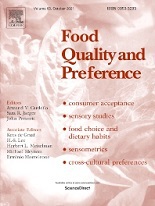References to home-made and natural foods on the labels of ultra-processed products increase healthfulness perception and purchase intention: insights for policy making
Dublin Core
Título
Tema
Abstract
As nutritional recommendations change, new marketing strategies are expected to appear on food labels to convey the idea that products are healthful and aligned with the recommendations. In this context, the objective of the study was to evaluate the effect of references to ‘home-made’, images of natural foods and nutritional warnings on consumers’ healthfulness perception and purchase intention of labels of ultra-processed products with excessive content of nutrients associated with non-communicable diseases (NCDs). The study was conducted with 790 Uruguayan Facebook users (65% female, 18–89 years old), diverse in terms of educational and
socio-economic levels. A choice experiment involving labels of four categories of ultra-processed products (burgers, cookies, instant soup and instant vanilla milk custard) was implemented. For each product category, eight sets of two labels differing in the presence of references to home-made, images of natural foods and nutritional warnings were designed. Half of the participants were asked to indicate the healthier product,
whereas the other half were asked to indicate the product they would purchase. Data were analyzed using mixed logit models. The inclusion of references to home-made and images of natural foods on the labels had a positive effect on purchase intention and tended to create the belief that products were healthful. Nutritional warnings decreased healthfulness perception and discouraged participants’ choice. In three of the product categories images of natural foods created a health halo that reduced the effect of nutritional warnings on product choice. Results from the present work suggest the need to develop stricter labelling regulations for ultra-processed
products with high content of nutrients associated with NCDs.
Fuente
Editor
Fecha
Derechos
(Por favor lea este aviso antes de abrir los documentos u objetos)
La legislación uruguaya protege el derecho de autor sobre toda creación literaria, científica o artística, tanto en lo que tiene que ver con sus derechos morales, como en lo referente a los derechos patrimoniales con sujeción a lo establecido por el derecho común y las siguientes leyes (LEY 9.739 DE 17 DE DICIEMBRE DE 1937 SOBRE PROPIEDAD LITERARIA Y ARTISTICA CON LAS MODIFICACIONES INTRODUCIDAS POR LA LEY DE DERECHO DE AUTOR Y DERECHOS CONEXOS No. 17.616 DE 10 DE ENERO DE 2003, LEY 17.805 DE 26 DE AGOSTO DE 2004, LEY 18.046 DE 24 DE OCTUBRE DE 2006 LEY 18.046 DE 24 DE OCTUBRE DE 2006)
ADVERTENCIA - La consulta de este documento queda condicionada a la aceptación de las siguientes condiciones de uso: Este documento es únicamente para usos privados enmarcados en actividades de investigación y docencia. No se autoriza su reproducción con fines de lucro. Esta reserva de derechos afecta tanto los datos del documento como a sus contenidos. En la utilización o cita de partes debe indicarse el nombre de la persona autora.
Formato
Idioma
Tipo
Identificador
Document Item Type Metadata
Original Format
- Fecha de agregación
- August 24, 2021
- Colección
- Bibliografía Nacional Química
- Tipo de Elemento
- Document
- Etiquetas
- Advertencias Nutricionales, Comporamiento del consumidor, Embalaje, Etiquetado, Marketing, Política alimentaria
- Citación
- Devia, Gabriela, “References to home-made and natural foods on the labels of ultra-processed products increase healthfulness perception and purchase intention: insights for policy making,” RIQUIM - Repositorio Institucional de la Facultad de Química - UdelaR, accessed August 25, 2024, https://riquim.fq.edu.uy/items/show/6325.
- Archivos

